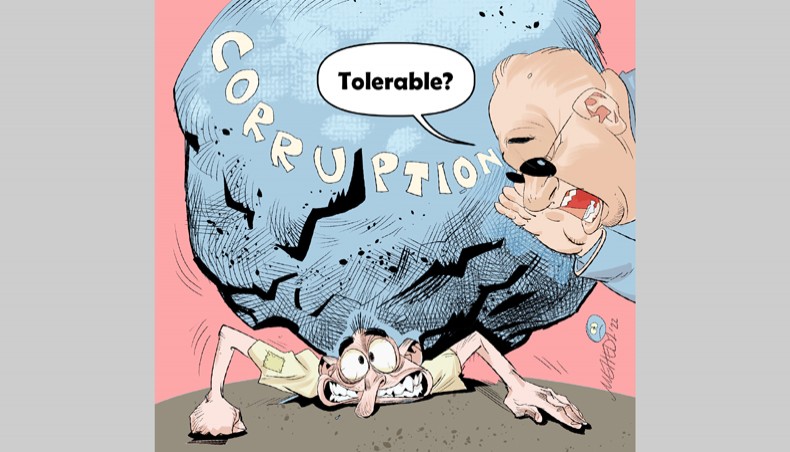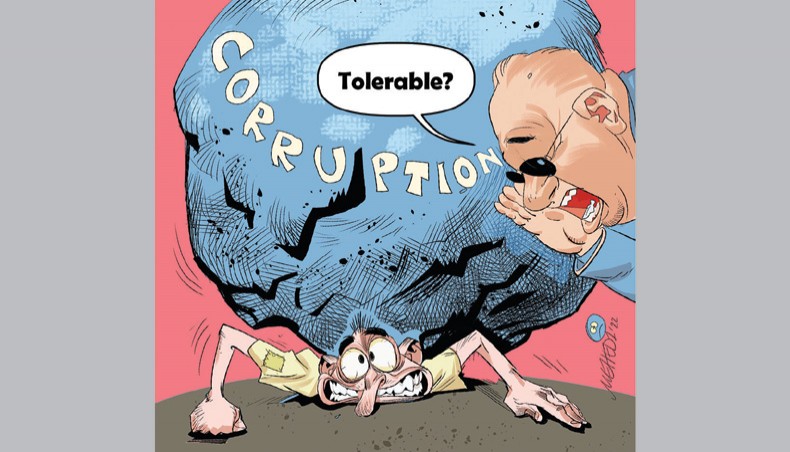
THERE is no denying that corruption is rampant in our society. It has been so widespread and deeply rooted that there are only a few individuals or organisations that corruption has not touched in one way or another. It has become so deeply embedded in our society that we have almost forgotten a life without it.
Corruption is a deadly virus. It has spread like a pandemic. In spite of all the hue and cry over the years, we do not find any respite from it anywhere. We find its presence almost everywhere, in food, medicine, land, business enterprise, bank, bureaucracy, police, custom, revenue, health, education, media, judicial, name any sector.
Why do we hear about a candidate seeking the job of a teacher in an MPO-listed private school requiring to pay as much as Tk 5 lakh to Tk 10 lakh as a bribe? Even the public universities of the country, supposed to be the bastion of knowledge, wisdom and values, are not free from this vice. More often than not, we hear about corruption, abuse of power, irregularities and political influence in the appointment and promotion of teachers in these universities.
Why do we hear about the Panama, Paradise and Pandora papers with the names of hundreds of top-ranking businessmen, politicians, government officials, celebrities, and mafia lords of different countries across the world syphoning off millions of dollars by unfair means and investing in the so-called offshore companies to evade taxes despite there being so many government machineries in the name of watchdogs to guard against financial scams?
Why does a file not move in our government offices without a bribe? They call it speed money. What an artistic name! Speed money. The machinery of religion may move in the air (dharmer kal batashe nore), but the government machinery does not. It needs money in the name of grease.
As was revealed by the leading Indian newspaper ‘Indian Express’, a couple of years ago, an investigation into the Pandora papers’ leaked information found the names of more than 300 Indian business tycoons, corporate bodies, celebrities, politicians, and other influential people in society. They were courteous enough not to mention the names of the Bangladeshi tycoons on the list of those tax havens. The number could be no less than 30, if not 300. Given the size of the country’s economy, Bangladesh is not falling far behind in the race to launder illegally earned money abroad.
Yes, we hear more often than not about the government’s zero-tolerance policy to fight corruption. We hear about stringent measures to deal with the situation, but in reality, how far have we progressed? The anti-corruption drives of the government start with a bang and end with a whimper.
The staggering loan default, we may say bad lone, to the tune of Tk 150–160 thousand crores, we hear about every other day, thanks to the print and electronic media, is the outcome of sinister designs orchestrated by corrupt business tycoons in collusion with the corrupt officials of banks and financial institutions. The result is that every child coming out of his or her mother’s womb today in this part of the world has to bear the brunt of a huge debt service, to say the least.
Corruption is multidimensional. A group of people are corrupt because they are poor. They cannot make both ends meet. They cannot afford milk for their babies or education for their children with the meagre income they earn. So, they find no other alternative than taking bribes or indulging in illegal means to earn money and maintain their livelihood.
Another group of people is rich but not as rich as their neighbours, although they consider themselves more qualified and efficient than their neighbours. Their neighbours, who drive expensive cars, live in posh houses. They cannot afford even a three-wheeler or a two-bed flat. The neighbours’ wives wear expensive dresses. The neighbours make holidays in Bangkok, Singapore or Switzerland. They cannot afford even a Kuakata trip. So they resort to illegal means and enter into an unhealthy competition.
Another group of people resort to corruption to become richer and richer by any means, and that is also overnight. They are ready to go to any extent—grab, cheat, or even kill anybody. The more they get, the more they want. With the money and wealth they earn out of the blue, they want luxury, lavishness and fantasy in life. The result is crime, violence, sexual abuse, extramarital affairs, and what not.
Where is the remedy? How do we put the bridle around the neck of the galloping horse of corruption and halt its maddening race? The economy of the country has been progressing rapidly in recent years. The country’s per capita income has risen to $3,000 from $500 in less than a decade. GDP growth has been moving around 6 to 6.5 per cent for quite some time. The country is poised to graduate from a least developed country to a developing country by 2026.
Yet, corruption can be a matter of grave concern for the economy to sustain. It can eat the very vitals of society, making the country unstable both economically and socially. Corruption breeds greed and lust. These elements, in turn, discard all basic human values and make people barbaric. No wonder, every day we hear in electronic, print, and social media about so many cases of financial scams, plunder, violence, killings, and rape—all for satisfying the greed and barbaric lust.
The Covid pandemic, followed first by the Russian invasion of Ukraine, has no doubt retarded the economic growth of Bangladesh, or almost the entire world. Millions of people have lost their jobs. Rising inflation, a steep rise in the unemployment rate, and an ever-threatening food and energy crisis are threatening the very fabric of society.
It is time to redeem the whole aspect of governing the country at this critical juncture. Every attempt must be made by every section of society to keep our younger generation free from this deadly virus of corruption.
There has to be a way to end the stigma of unbridled corruption that is eating away at the very vitals of our economy. Corruption must be dealt with by the government with iron hands. People do not want to hear rhetoric from our politicians or policymakers in government any more. They want business.
New Age

